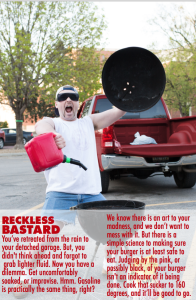The STEC beef safety #Grill160toKill tailgate project hits Virginia Tech:
Grilling burgers in your backyard or at a late afternoon tailgate doesn’t seem like a scenario set for danger, but your burger can bite back if bacteria is allowed to remain in the meat, Virginia Tech researchers say.
Daniel Gallagher, an associate professor in the Via Department of Civil and Environmental Engineering, is the principal investigator on a collaborative project to track thermometer use in cooking hamburger meat. Renee Boyer, associate professor of food science and technology, and Virginia Cooperative Extension specialist in the College of Agriculture and Life Sciences is collaborating on the project, a joint effort with North Carolina State University, Kansas State University, University of Nebraska, and Texas A&M.
Boyer and her lab have been distributing kits at Virginia Tech football tailgates that contain a digital read out thermometer, an apron, and a beverage koozy with temperature guidelines. The goal is to prompt people to monitor the temperature of their ground beef.
The team will be handing out supplies around campus parking lots again at a future football game. They will also be checking in with people who have already received kits to see if they are using proper cooking techniques.
The group has launched a social media campaign on Instagram and Twitter. Users who post photos with the thermometer reading 160 degrees with meat using the hashtag #Grill160toKill will be entered to win an iPad.
“We are trying to create an awareness of the importance of grilling meats to 160 degrees to avoid E.coli illnesses by using a thermometer and seeing if we can shift the public’s attitude about monitoring cooking temperatures,” said Boyer.
The bacteria — Shiga-toxin producing Escherichia coli, or STEC — are associated with at least 265,000 illnesses per year.
Cooking meat to 160 degrees kills E. coli bacteria.
“You go to the doctor to monitor your sodium and cholesterol; using a thermometer to cook meat is the same principle,” said Lily Yang, a doctoral student from San Francisco. “It’s a preventative measure.”
Hamburger, as opposed to steak which has only the surface area exposed, can potentially have contaminants distributed throughout the patty because the meat is ground and mixed.
“As a consumer you are the last line of defense against getting sick from consuming E. coli bacteria,” said John di Stefano, a master’s student from Midlothian, Virginia. “Using a thermometer to monitor your cooking temperature is the best way to do that.”
The outreach effort is funded by a $25 million grant from the U.S. Department of Agriculture.
